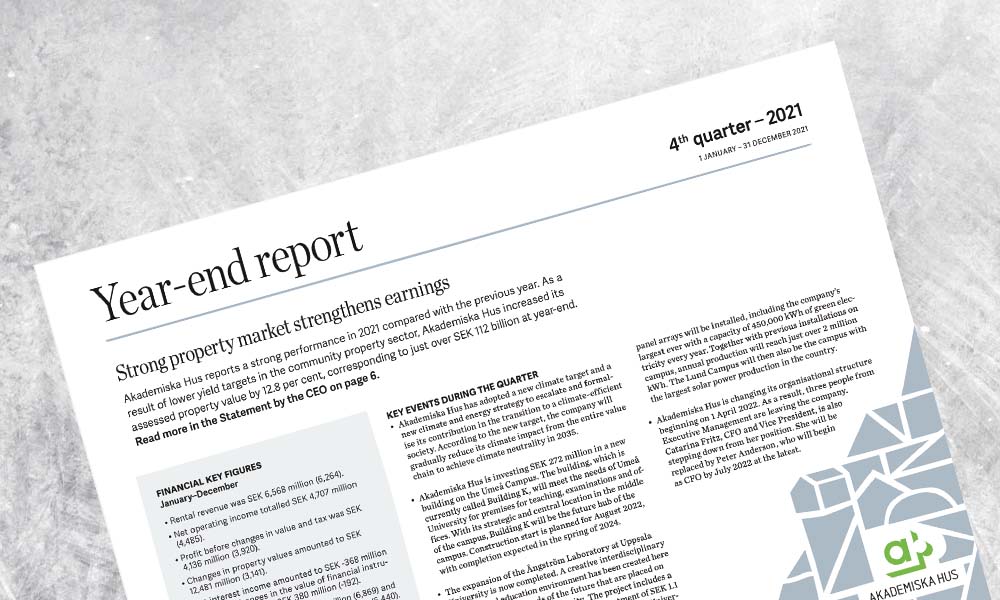Year-end report 2021: Strong property market strengthens earnings
Wednesday, 16 February 2022
Year-end report 2021 in brief:
- Rental revenue was SEK 6,568 million (6,264).
- Net operating income totalled SEK 4,707 million (4,485).
- Profit before changes in value and tax was SEK 4,136 million (3,920).
- Changes in property values amounted to SEK 12,481 million (3,141).
- Net interest income amounted to SEK -368 million (-381) and changes in the value of financial instruments amounted to SEK 380 million (-192).
- Profit before tax was SEK 16,997 million (6,869) and profit for the period was SEK 13,790 million (5,440).
- Investments in redevelopment, extensions and new construction totalled SEK 2,524 million (2,872).
- Properties worth SEK 2,293 million (5) were sold during the year. The capital gain amounted to SEK 29 million (3).
- The yield (excluding properties under construction and expansion reserves) was 4.7 per cent (5.0) over the past 12 months.
2021 is a year that has consistently been marked by the pandemic. For Akademiska Hus’ customers – Sweden’s higher education institutions – it has been a challenging period, since a large part of teaching and activities have taken place digitally and remotely, although in the autumn some activities returned to campus life. The record-breaking pace of digitalisation has resulted in demands for developing new teaching practices, tools and solutions for hybrid teaching.
“It is difficult to know at the present time what effects and insights will endure, since the analysis is currently in full swing, but it will undoubtedly affect the long-term requirements for designing premises in terms of function and flexibility. Throughout the year, we engaged in close and constructive dialogue with our customers in an effort to understand how we should develop our offering moving forward,” says Caroline Arehult, CEO of Akademiska Hus.
The property market has continued to develop at a strong pace during the fourth quarter of the year, with continued reduced yield requirements and cost of capital, as well as a record high transaction volume during both the fourth quarter of the year and the full year. Community properties are among the segments that have had the largest reductions, thanks to their low vacancy risk and predictable cash flows. In light of this situation, Akademiska Hus has adjusted its assumptions regarding yield requirements and cost of capital in its valuation. Along with investments in new construction and redevelopment, as well as other cash flow changes, this means that the company’s assessed property value now amounts to just over SEK 112 billion.
During the year the company continued its initiative to digitalise the property holdings through measures such as creating digital twins. Construction began on a number of projects, such as a new building for the School of Business, Economics and Law in Gothenburg. Two major construction projects were completed during the year, the Ångström Laboratory in Uppsala, which is an investment of SEK 1.1 billion, and the second of three stages of the Albano Campus in Stockholm, where Akademiska Hus is investing a total of approximately SEK 3 billion.
Akademiska Hus has adopted a new climate target and a new climate and energy strategy to escalate and formalise its contribution in the transition to a more sustainable society.According to the new target, the company will gradually reduce its climate impact from the entire value chain to achieve climate neutrality in 2035.
“As part of our sustainability work, we will increase our focus on utilising our existing property portfolio by seeking solutions where we primarily renovate and adapt existing buildings based on the new needs that arise,” says Caroline Arehult.